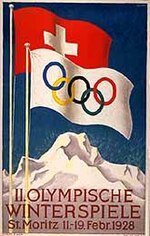
Back Санкт-Мориц 1928 Abkhazian Olimpiese Winterspele 1928 Afrikaans Chuegos Olimpicos d'hibierno de 1928 AN الألعاب الأولمبية الشتوية 1928 Arabic اوليمبياد شتا 1928 ARZ 1928 Qış Olimpiya Oyunları Azerbaijani Olimpiade Masan Dingin 1928 BAN Зімовыя Алімпійскія гульні 1928 Byelorussian Зімовыя Алімпійскія гульні 1928 году BE-X-OLD Зимни олимпийски игри 1928 Bulgarian
This article includes a list of general references, but it lacks sufficient corresponding inline citations. (February 2013) |
 Hugo Laubi's poster for the 1928 Winter Olympics | |
| Location | St. Moritz, Switzerland |
|---|---|
| Nations | 25 |
| Athletes | 464 (438 men, 26 women) |
| Events | 14[a] in 4 sports (8 disciplines) |
| Opening | 11 February 1928 |
| Closing | 19 February 1928 |
| Opened by | |
| Stadium | St. Moritz Olympic Ice Rink |
Winter Summer | |
The 1928 Winter Olympics, officially known as the II Olympic Winter Games (French: IIes Jeux olympiques d'hiver; German: II. Olympische Winterspiele; Italian: II Giochi olimpici invernali; Romansh: II Gieus olimpics d'enviern) and commonly known as St. Moritz 1928 (French: Saint-Moritz 1928; Romansh: San Murezzan 1928), were an international winter multi-sport event that was celebrated from 11 to 19 February 1928 in St. Moritz, Switzerland.
The 1928 Games were the first true Winter Olympics to be held as a stand-alone event, not in conjunction with a Summer Olympics. The preceding 1924 Winter Games were retroactively renamed the inaugural Winter Olympics, although they had in fact been organised alongside the 1924 Summer Olympics in France. Before 1924, the winter events were included in the schedule of the Summer Games and there were no separate Winter Games. The 1928 Winter Games also replaced the now redundant Nordic Games, which had been held at varying intervals since early in the 20th century.
The hosts were challenged by fluctuating weather conditions; the opening ceremony was held in a blizzard, while warm weather conditions plagued sporting events throughout the rest of the Games.[1] The 10,000 metre speed-skating event was controversially abandoned and officially cancelled.[2] Filmed footage of the games exists in a silent, feature-length documentary, The White Stadium.
Cite error: There are <ref group=lower-alpha> tags or {{efn}} templates on this page, but the references will not show without a {{reflist|group=lower-alpha}} template or {{notelist}} template (see the help page).
- ^ Findling, John E.; Pelle, Kimberly D. (2004). Encyclopedia of the Modern Olympic Movement. Westport, Connecticut: Greenwood Press. p. 290. ISBN 0-313-32278-3.
- ^ "1928 Sankt Moritz Winter Games". Sports Reference LLC. Archived from the original on 17 April 2020. Retrieved 12 March 2009.